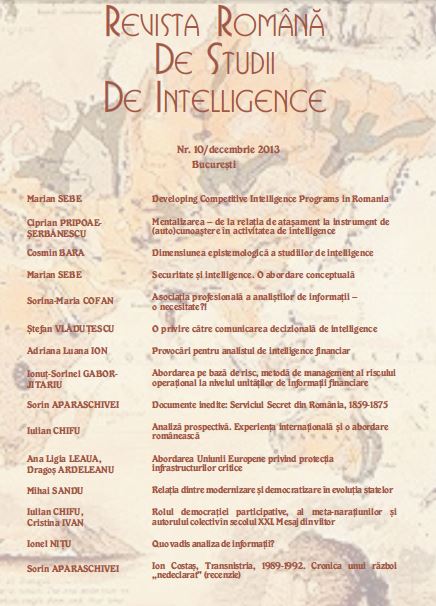Analiză prospectivă. Experienţa internaţională şi o abordare românească
Foresight. The international experience and a Romanian approach
Author(s): Iulian ChifuSubject(s): Social Sciences
Published by: National Institute for Intelligence Studies
Keywords: Prospective analysis; decision making in crisis; foresight; discontinuous analysis; Rene Thom catastrophes theory
Summary/Abstract: Prospective analysis is an important component of foresight and strategic planning. There is a worldwide set of methods in this field with uneven results, but also similar exercises at the level of prospective analysis in intelligence. International experience, however, also reveals the difficulties in making predictions in times of raised “tectonicty”, such as crises, and the manner in which prospective analysis can be approached in these cases. In Romania too, prospective studies tackle the classical themes and methodology, but there are also specific areas with an added value which are able to play important roles in prospective analysis. Thus, prospective studies continue to use evolutions considering the trend, while other methodological versions and working with scenarios cover de lack of information and data in other cases. But there continues to exist also a theoretical and practical concern for the method of discontinuous analysis, of “jump” or “catastrophe” of game changer studies in current situations, as well as a likelier tendency in analyzing rare, improbable phenomenon – black swan events – but which are becoming more and more real in times of crises, of change in the nature of the international system or of emergence of new relevant actors from little quantified spaces which noticeably influence international evolutions. The Crismart Crisis Assessment Methodology of the Centre for Conflict Prevention and Early Warning, as well as its own methodology of analysis of ongoing events based on trends and on the point of view of the decision maker, bring an added value with a strong Romanian fingertip to this type of prospective analysis, with the perspective of creating a national integrated crisis management system for the use of decision makers.
Journal: Romanian Intelligence Studies Review
- Issue Year: 2013
- Issue No: 10
- Page Range: 167-186
- Page Count: 20
- Language: Romanian

